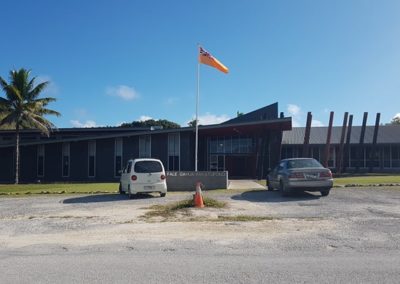About Us
Our purpose
“Statistics for prosperity”
The underlying purpose of the Niue Statistics Office is to uphold and administer the Niue Statistics Act 2009 and be a key provider and leader of statistical information and services to Government, Businesses, Non-Government Organisations, the People of Niue, and International organisations. Our activities support the Government development goal of the Niue National Strategic Plan (NNSP)
We deliver our services and projects across a range of activities. These include:
- Provide leadership and coordination for the official statistical activities and processes of Niue – Collect, compile, analyse and dissemination.
- Advise of statistical undertakings
- Assist and direct the release of official statistica for ther government agencies,
- Assist in the collection and dissemination of official statistics in Niue
Our mission is to collect, process, analyse, and disseminate accurate and timely statistics in accordance with the Niue Statistics Act 2009, the Niue National Strategic Plan 2016-2026 and to be consisten with international standards and user needs.
Our vision is to be a key provider and leader of statistical information and services.
Core functions
The availability of and access to relevant, accurate and timely statistics will greatly assist the policy making. Availability of good statistics will enable evaluation and assessments of the effectiveness and relevance of existing policies.
Therefore our core function in the Statistics Niue Office include:
- The ability to deliver: Collecting, processing, analysing and dissemination of official statistics in a timely manner
- To produce good and accurate statistics and statistical information: Statistics Niue office will maintain the care and diligence required in collecting, processing, and analysing of statistics to make sure that all information put out must be of good quality.
- Collecting: Statistics Niue Office will continue to foster and promote a good working relationaship and working in partnerships with all data provides to ensre best practices are observed at all times to supply quality data.
- Processing: Statistics Niue office will continue to maintain sound processing systems and infrastructure to ensure that the processing of statistics is done effectively and efficiently.
- Analysing: Qualitative and quantitative analysis of the statistics shall be provided by Statistics Niue office. The analysis shall be clear and straight forward for users to utilise them particularly their decision making processes.
- Dissemination: Key users of statistical information will have easy access to the access to (key) statistics information through printed materials such reports and periodical releases or through electronic means such as office websites on the internet.
- Timeliness: Statistics Niue will ensure that statistics be made available to the users in a timely manner such as at the end of a quarter (for the periodical releases), annually (for survey reports) or every 5 years (for censuses).
- Building Capacity: Capacity building is imperative not only in seeing that new and improved developments are implemented efficiently and effectively but also in ensuring that good practices in the statistical processes are maintained. Capacity building will strengthen the capabilities of the statistics office to meet the ever increasing demand for statistics from all users. Statistics Niue is to maintain working together with Development partners in ensuring the capacity building needs of the office are met.
Operation structure
The operation structure of the Statistics Niue Office is highlighted in the Niue Statistics Act 2009 and the Fundamental Principles of Official Statistics of the United Nations Statistical Division.
The Niue Statistics Act 2009 Provides the legal framework and authority for functions and operations of the National Statistical System of Niue. It empowers the Statistics Niue Office (SNO) to produce timely and accurate statistics about the economic, social, and environmental characteristics of Niue for use by government departments, private institutions, businesses, overseas organisations, researchers, students, and the general public.
Fundamental Principles of Official Statistics (UNSD)
The fundamental principles of official statistics provide the guidelines and best practices to which the Statistical Niue office and other statistical agencies in the Niue Statistics System adhere to.
- Principle 1. Official statistics provide an indispensable element in the information system of a democratic society, serving the Government, the economy and the public with data about the economic, demographic, social and environmental situation. To this end, official statistics that meet the test of practical utility are to be compiled and made available on an impartial basis by official statistical agencies to honour citizens’ entitlement to public information.
- Principle 2. To retain trust in official statistics, the statistical agencies need to decide according to strictly professional considerations, including scientific principles and professional ethics, on the methods and procedures for the collection, processing, storage and presentation of statistical data.
- Principle 3. To facilitate a correct interpretation of the data, the statistical agencies are to present information according to scientific standards on the sources, methods and procedures of the statistics.
- Principle 4. The statistical agencies are entitled to comment on erroneous interpretation and misuse of statistics.
- Principle 5. Data for statistical purposes may be drawn from all types of sources, be they statistical surveys or administrative records. Statistical agencies are to choose the source with regard to quality, timeliness, costs and the burden on respondents.
- Principle 6. Individual data collected by statistical agencies for statistical compilation, whether they refer to natural or legal persons, are to be strictly confidential and used exclusively for statistical purposes.
- Principle 7. The laws, regulations and measures under which the statistical systems operate are to be made public.
- Principle 8. Coordination among statistical agencies within countries is essential to achieve consistency and efficiency in the statistical system.
- Principle 9. The use by statistical agencies in each country of international concepts, classifications and methods promotes the consistency and efficiency of statistical systems at all official levels.
- Principle 10. Bilateral and multilateral cooperation in statistics contributes to the improvement of systems of official statistics in all countries.
Challenges and risks
In every success stories such as the achievement of the vision there are always constraints or challenges and risks in it.
Production of Statistics: Staff capacity is a critical issue for the SNO in order to deliver the necessary services and statistical information. There are only 3 staff members in the SNO and the demand for statistics is increasing. SNO will have to draw upon assistance and support from Government Departments and Corporations to collect and extract data from their administrative records; from regional and international institutions such as the Secretariat of the Pacific Community (SPC), Statistics New Zealand (SNZ) and others to provide technical assistance on strategic areas and needs from time to time.
Building Relationships: In an ideal situation there should be free participation between Government Departments and Corporations with SNO in sharing information but this is not necessary the case. Some key providers do hold fast to their information. However, with the Statistics Act this will empower the SNO to obtain the data required.
Data Quality and Reliability.
SNO endeavours to provide information that are of good quality and reliability and will do its utmost best to minimise any errors that may compromise this and the real purpose of providing statistics. However, the constraints faced by SNO in this matter hinge around the capacity and the capability within office as well as other offices or agencies that provides statistics.
Capacity building: Capacity building is an on-going concern as it will ensure office capability to provide for the expectations required of SNO.
- We will continue to provide high quality training to office staff in office on the job and through overseas workshops.
- We will continue to provide high quality training to our enumerators so that they can collect good information.
- We will also make sure that the respondents understand what the survey is about and why they are being asked to fill in the questionnaires.
- We will also train people in other government departments who collect data on our behalf to get good quality information.
- We will provide them with the necessary tools and an understanding of the statistics and highlight the important role they play in delivering quality statistics for Niue.
- We will also train the key people in government and others who use our statistics in order to develop good policies for the people of Niue.
- We will seek technical assistances from development partners to help out where possible on certain areas such as national accounts, government financial statistics and others.
- One thing that we do not have much control over but to try and minimise is the retention of staff members in SNO. Skilled staffs were lost to other government departments and corporations because of the remuneration levels they received there as favourable to that offered by NSO.
General information
Address:
Statistics and Immigration Office
Finance and Planning
Niue Public Service Building
Alofi
Niue
Opening hours:
Hours: We’re open 8am to 4pm EST
Monday to Thursdays (excluding public holidays)
Contact us
For general requests or feedback on the services we provide, you can contact us directly using the contact form or call us directly:
Phone number:
Main office: (683) 4219
Niue Public Service Building: (683) 4047



